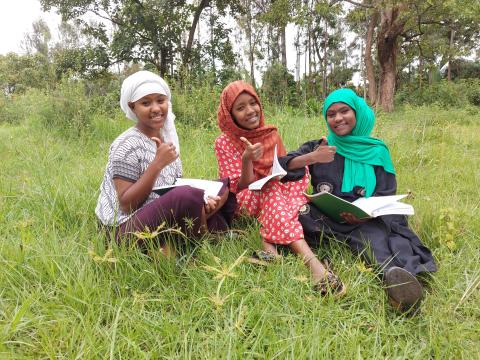Addressing Child Labour through Child Parliament

Assume you've given your lovely, intelligent daughter to your closest relatives to provide her with a better education while keeping her safe and comfortable. Your relative, however, has betrayed your trust, taken advantage of your precious daughter, and forced her into child labour. What would you do and feel as a parent or guardian had you been in this position?
This is what 14-year-old *Simret experienced. She was formerly the best student in the school, receiving annual recognition for her outstanding performance. Where she lived, the school only taught grades 1 through 6. Simret had to choose between commuting two hours a day from her parent's house to school and back or staying at her aunt's house to complete grades seven and up. Her mother decided she would stay at her sister's house rather than go back and forth.
"When my mother brought me here, my aunt was delighted and vowed to do everything in her power to help me attend school. She, however, gradually began to break her commitment. She turned me into her housemaid. I used to make injera (a local stable meal) and coffee, gather firewood, fetch water, clean the house, do laundry, and look after her baby son. As time passed, I became accustomed to arriving late to school. I gradually began missing two or three days of school per week," she recalls regretfully.
Her aunt also beat her with everything within her reach. She says, "I didn't have time to study or do homework. When I complained about the size of the workload, she hit me hard. She was not providing me with enough food as well. For fear of this, I complied with all her requests."
Her school performance suffered an unprecedented drop because of the heavy workload and frequent absences. She claims, "I used to top in all elementary classes. My performance plummeted almost instantly after I started to live with my aunt. Out of 70 students, I came in 43rd place. I was barely promoted to the next grade."
Simret’s aunt repeatedly urged her not to tell her parents about the workload she faced. She says, ''My aunt was extremely cruel. When my mother visited me, she pretended to be the kindest woman. She presumably prohibited us from spending time together. I lacked the confidence to divulge the maltreatment for fear of repercussion.”
Child rights violations were widespread in Sokoru District. The Sokoru Area Sponsorship programme implemented various child protection initiatives and established a child parliament to raise awareness of children's rights and alleviate suffering. The Child Parliament raises awareness in schools and the community through face-to-face discussions, music, and drama performances. It also deploys its members across the village and monitors their welfare to ensure children are protected and safe.
Ayida, the vice chairperson of the Sokoru Child Parliament, saw Simret heading home with a large jerrycan full of water. Ayida took time and interrogated Simret about why she was outside the school during school hours. Simret poured out all the challenges she was facing. “Her challenge was more than she could express. I was deeply saddened by her challenge and vowed to do everything I could to free her from the bonds of child labour," Ayida sadly recounts.
Ayida and the other child parliament members approached Simret's mother and briefed her on everything. Simret's aunt admitted her guilt and apologised.
Simret's mother rented a house for her daughter to ensure her independence. The child parliament are following up on her security from time to time. She began to attend classes regularly. It had been six months since she started living on her own. Her school performance has significantly improved ever since. "My academic performance has greatly improved. I earned 96 average grades and finished third in school. Thanks to the Child Parliament's intervention to ease my burden.” She explains with a smiling face.
"I'm always concerned about my district farmers' traditional farming methods. I am optimistic that I will be able to fulfil my long-held dream of becoming an agriculturalist while empowering farmers in my community to become self-sufficient and move from oxen to modern tractor farming," she says proudly.
Ayida has been serving as child parliament vice head for three years now. She says, “Since I assumed this role, we have visited every school in the district and educated all of the kids about child rights issues. We have also followed the same protocol at multiple community events. In the last three years, we have freed more than 15 children from the bonds of child labour and early marriage.”
* The name has been changed to protect the identity.
By Aklilu Kassaye, Field Communication Manager, World Vision Ethiopia